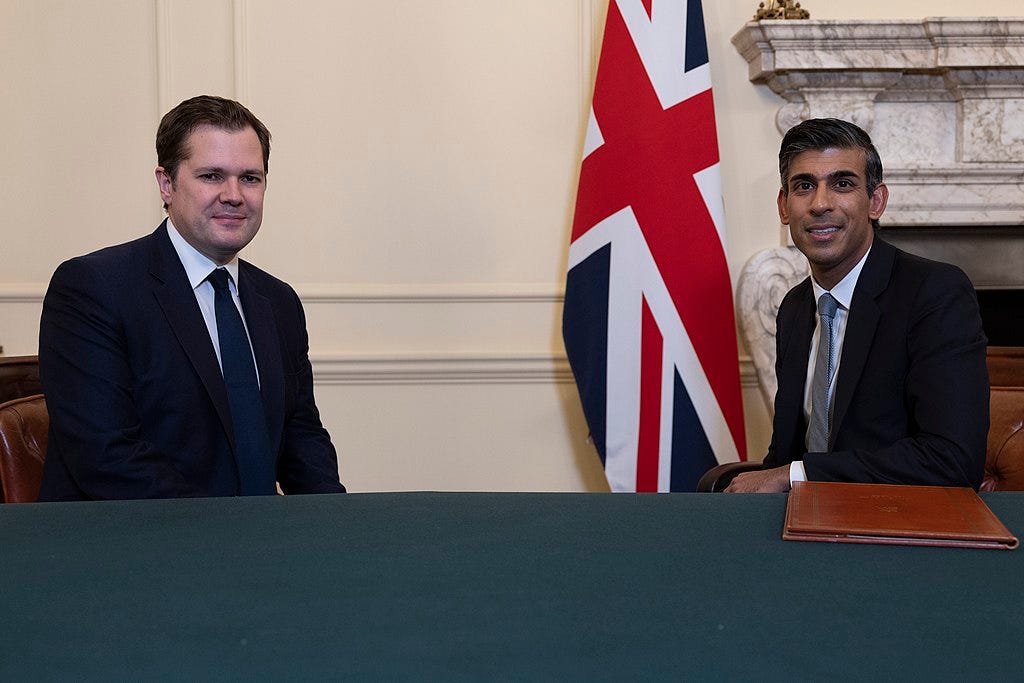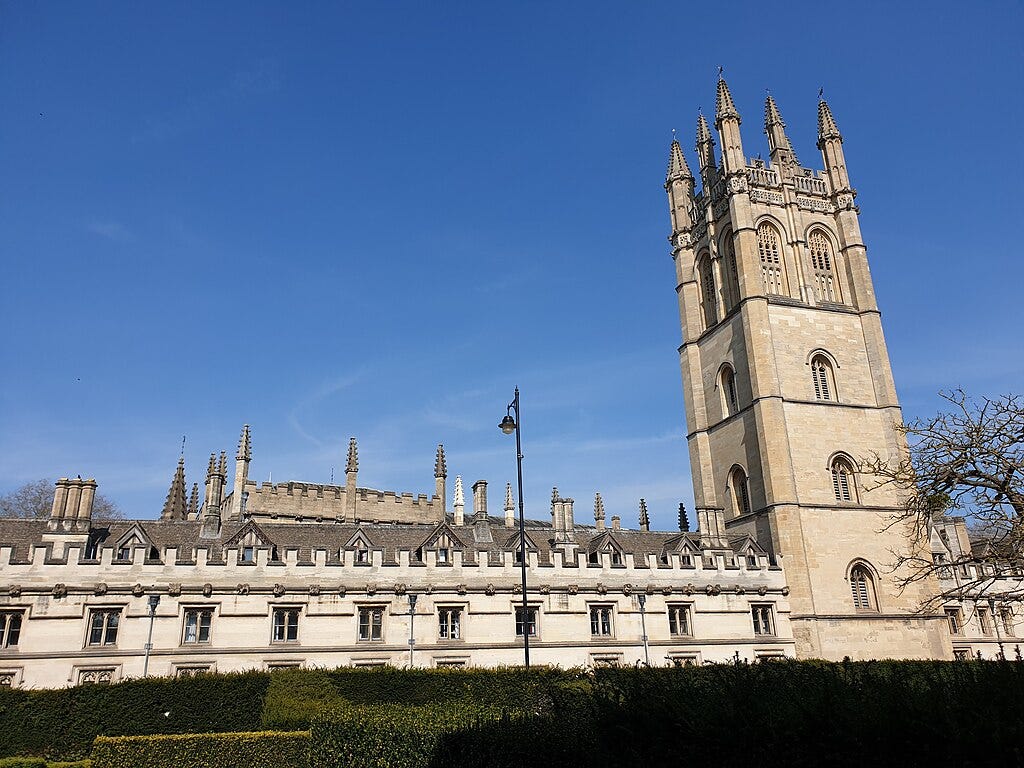News Round-Up: CO2’s Inability To Warm the Climate, IOC Study Finds 'Trans women' Not Biological Men and the Myth of the Economic Benefit of Mass Migration
Every week, the editorial team of Freedom Research compiles a round-up of news that caught our eye, or what felt like under-reported aspects of news deserving more attention.
Over the past week, the following topics attracted our attention:
Research papers: CO2 cannot warm the climate.
International Olympic Committee study: 'trans women' are not biological men.
Former UK immigration minister: mass immigration does not bring economic benefit.
Oxford University Magdalen college celebrated the end of Ramadan instead of St. George's Day.
Study: youngest children suffered the most because of Covid school closure policies.
Research papers: CO2 cannot warm the climate
Polish scientists led by Dr. Jan Kubicki have published three papers claiming that higher levels of CO2 in the atmosphere are not directly causing global temperatures to rise, reports The Daily Sceptic. The latest paper published by the Polish researchers in Science Direct has also been peer-reviewed.
While the researchers confirm that CO2 as a greenhouse gas has a warming effect, they say that this can only be said until CO2 has reached a certain level in the atmosphere. At present, there are about 418 parts per million (ppm) of CO2 in the atmosphere, and the atmosphere is saturated with it. According to the scientists, CO2 does not have a warming effect if it is present in the atmosphere at levels of more than 400 ppm.

The saturation hypothesis is complex, but in simple terms, it can be described by the example of loft insulation in a house. After a certain point, doubling the lagging will have little effect since most of the heat trying to escape through the roof has already been trapped. Carbon dioxide traps heat only within narrow bands of the infrared spectrum, and levels of the gas have been up to 20 times higher in the past without any sign of runaway global warming.
International Olympic Committee study: 'trans women' are not biological men
A study financed by the International Olympic Committee (IOC) aimed at clarifying whether men who call themselves women, or 'trans women', can be allowed to compete in women's categories in Olympic sports and came to a curious conclusion. According to Yannis Pitsiladis, one of the study's authors and a member of the IOC's medical and scientific commission, its most important conclusion, given the physiological differences between trans women and women, was that "Trans women are not biological men". The study's authors came to this conclusion by analysing the physical abilities of men who say they are women ('trans women') and real women. According to the study, trans women (men) showed greater handgrip strength — an indicator of overall muscle strength — but lower jumping ability, lung function, and relative cardiovascular fitness compared with women whose gender was assigned female at birth.
But it turns out there was a simple reason for this result. "This study compared unfit, overweight transwomen (males) to fit females. The findings cannot be extrapolated to a comparison of fit TW & fit females. It is worthless,” wrote Cathy Devine, a former senior lecturer in sport and physical activity at the University of Cumbria for more than two decades.
UnHerd, however, commented on the authors of the study that 'their use of the terms "cisgender" women and "assigned female at birth" to refer to women in this study does not indicate an impartial approach, while raising a fascinating question.' “If we are all randomly assigned a sex at birth, how are we to know that the “cisgender” women in the study were actually female, rather than boys brought up in the “wrong” gender?” the publication asked.
The IOC can now decide whether to take the findings of the study into account and follow the recommendation of the authors, who called for caution in introducing rules that would prohibit men claiming to be women from participating as women in Olympic sports.
Former UK immigration minister: mass immigration does not bring economic benefit
Conservative British MP and former immigration minister Robert Jenrick says that successive governments have betrayed voters on the issue of immigration. According to him, the view that mass immigration is good for a developed nation's economy is a myth that needs to be debunked. He himself resigned as immigration minister last year precisely because of his failure to persuade the government and PM Rishi Sunak to tighten its immigration policy.
Jenrick considers the government's policy of immigration a 'complete disaster'. For decades, he says, voters have been promised that immigration would be cut. “The numbers are just so large that it has a proportionally much greater impact on everyone’s lives. This cuts to the housing crisis, why we have such low productivity, and why we have concerns about community cohesion and integration,” he said.

Immigration to the UK has remained at record levels, with large numbers of immigrants arriving illegally on small boats across the English Channel. This has been going on for years and the situation has become routine, so that, for example, the UK government regularly publishes statistics for the last seven days on the number of boats seen at sea and the number of immigrants heading for Great Britain.
Such illegal immigration has been pledged by PM Sunak to be halted, and illegal immigrants deported, but Jenrick notes that legal immigration is also a problem, as almost a million people arrive by year already. Less than a fifth have come on work visas. "So, the overwhelming majority of people were students, dependants, or were those coming as refugees,” he says. “One can make arguments for and against each of those categories, but they’re not people who are demonstrably making an economic contribution to this country,” Jenrick adds. He says the country needs to reduce the number of low-skilled immigrants and prioritise immigration in sectors where a highly skilled workforce is needed.
That mass immigration does not bring economic benefits, and in fact comes at an increased cost, has been shown before. For example, in November 2021, a report by the Danish Ministry of Finance revealed that the cost of immigration from non-Western countries amounted to €4.2 billion in 2018.
Similarly, a study published by the University of Amsterdam in December last year showed that the cost of decades of mass immigration on the Dutch public sector was €400 billion between 1995 and 2019, or an average of €17 billion per year.
Oxford University Magdalen College celebrated the end of Ramadan instead of St. George's Day
Traditionally, Oxford University's prestigious Magdalen College has celebrated the patron saint of England, St. George's Day, on 23rd of April, but this year, for the second year in a row, it was cancelled. Instead, the college hosted a banquet on 21st of April to mark the end of the Muslim fasting month of Ramadan. A banquet invitation sent to students and supporters by the college's vice-chancellor, Reverend Professor Robert Gilbert, noted that the gathering would serve halal meat and no alcohol, in accordance with Muslim customs. The invitation also stated that this was a joyous occasion and that cultural dress was both welcome and encouraged.

Magdalen College was founded in 1458 by William of Waynflete, Bishop of Winchester, and named after St Mary Magdalene. The celebration of St. George's Day has been a landmark tradition in England. As well as being the patron saint of England, the cross of St. George also features on the English flag.
Douglas Murray, who has written several books on the cultural decline of the West (read book reviews here and here) has also studied at Magdalen College. “I read this with amazement because I’m all for being inclusive … but part of the point of freedom of religion is you don’t force other people into following your rules,” he said. “We had Ramadan lights up across Oxford Street this year thanks to Sadiq Khan and others. St George’s Day, there … doesn’t seem to have been a cross of St George in sight,” he added.
Study: youngest children suffered the most because of Covid school closure policies
Children who had only just started school during the Covid pandemic will have the worst GCSE exam results in the future because of the prolonged damage wrought by school closures, a study has found, according to The Telegraph.
The study, published by academics from the universities of Exeter and Strathclyde, and the London School of Economics, analyses how school closures during Covid-19 hindered children’s development at age five, 11, and 14.
The study suggests the impact on GCSE results will be greater for children who were younger during the pandemic. It showed that there was a particularly adverse impact on the academic and social skills of children in their formative years. Research has found that cognitive skills at age five are highly predictive of cognitive skills later in childhood.

The study predicts that boys aged five during Covid school closures are up to 4.4 percentage points less likely to achieve five GCSE passes than children who took their GCSEs in 2023. Girls aged five during the pandemic are 4.8 percentage points less likely to achieve five good GCSEs, according to the model.
Prof Lee Elliot Major, one of the report authors and a professor of social mobility at the University of Exeter, said: “We’ve had lots of debates about the pandemic, it could be that the sort of worst legacy of all is actually the damage to the education of a whole generation of children.”





Good morning. I think your consistent emphasis on countering the CO2 story makes the same error that the ‘other side’ do; a single minded emphasis on the role of carbon reduction. I am interested in physics, and the physics is simple – rising CO2 in the atmosphere will increase the earth surface temperature, as your recent link to Dr Curry points out. The analogy of CO2 saturation functioning like loft insulation is totally wrong in this context (https://skepticalscience.com/at-a-glance-saturate.html).
The physics of greenhouse gases may be simple, but climate is a complex systems. You would give a more balanced and credible picture if your posts reflected the complex nature of the climate– eg I have never seen any posts of yours about the negative warming effects of man made SO2, which would bolster your arguments. (https://brage.npolar.no/npolar-xmlui/bitstream/handle/11250/173059/Meddelelser119.pdf?sequence=1)